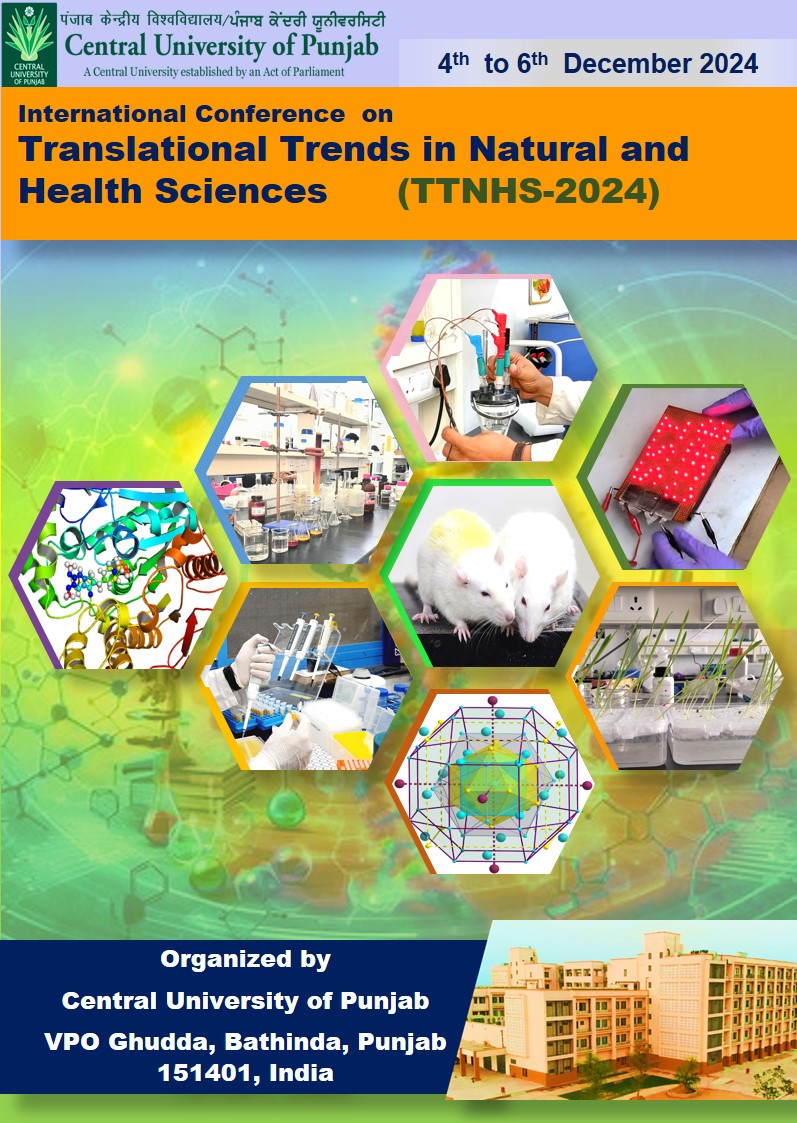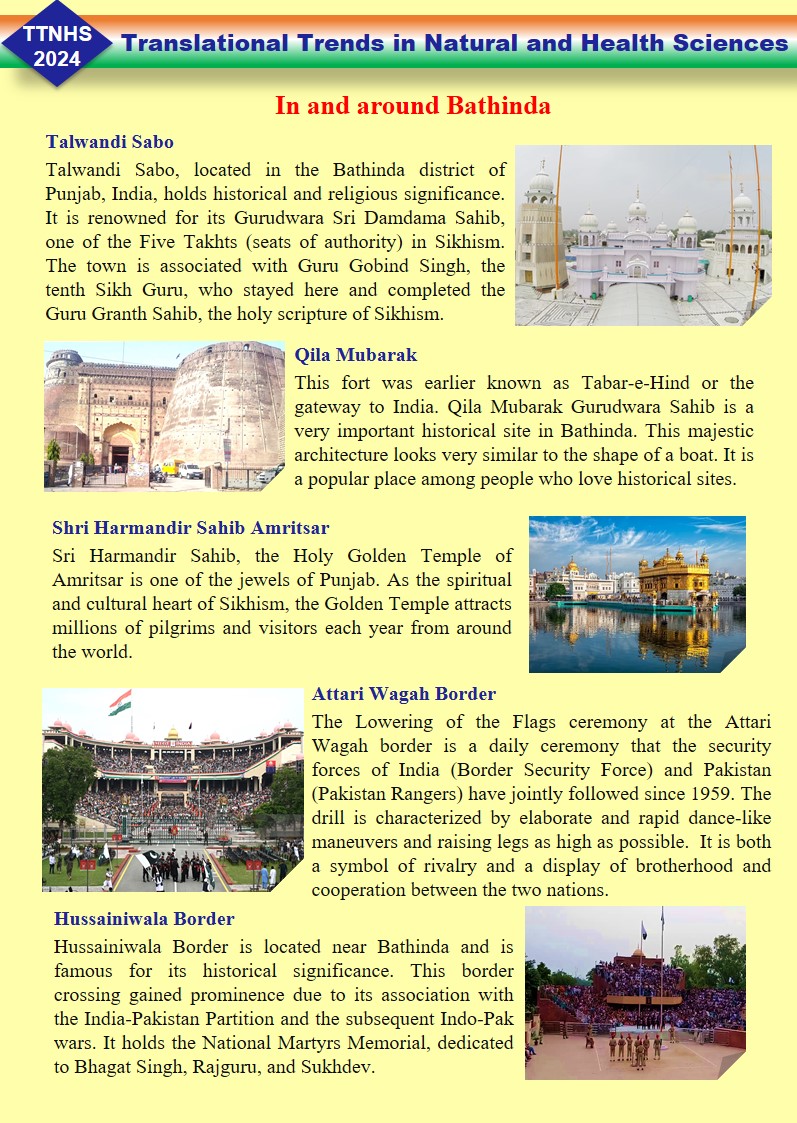TTNHS 2024

Introduction:
Scientific discoveries often remain theoretical until they are translated into real-world solutions. Translational research acts as the conduit between theoretical knowledge and practical applications, hastening the development of impactful innovations. This interdisciplinary approach amalgamates insights from diverse fields to tackle intricate challenges and ensuring a sustainable future.
The International Conference on Translational Trends in Natural and Health Sciences (TTNHS-2024) is a sincere effort by the Central University of Punjab to bring together esteemed academicians and scientists from globally renowned institutions. The conference facilitates exchange of scientific advancements in the translational research involving Chemical, Physical, Mathematical, Biological, and Health Sciences while nurturing the aspirations of young scholars. In Chemical and Physical Sciences, discussions will be focused on translating theoretical models into tangible technologies, focusing on renewable energy, quantum computing, and advanced materials. Sessions on Mathematics and Computational Sciences will explore real-world applications such as big data analysis, environmental modelling, and risk management. A special session is planned on the Indian Knowledge System inviting deliberations on the spirituality and its correlation with the quantum and metaphysics.
In Biological sciences, the conference will highlight biotechnological, agricultural and medical breakthroughs. The discussions will be focused on plant biotechnology, marine resources, future crops, agricultural waste management for sustainable development. Health Science sessions will feature emerging therapeutic modalities, breakthroughs in drug discovery, vaccine development and translation of basic scientific discoveries into clinical practice for improved health outcomes. There will be deliberations on traditional health care systems including AYUSH.
TTNHS-2024 will feature plenary, keynote, and invited talks by distinguished experts, providing invaluable insights into the latest trends and challenges. The three-day event will encourage dialogue and collaboration between Academicians, Scientists, Clinicians, Researchers, Policymakers, and Industry stakeholders. Moreover, the conference will offer excellent opportunity for the budding scientists and research scholars to display their work before eminent experts and compete for various awards. Best Poster, Best Oral Presentation, and Young Scientist Awards will be given in different categories. We cordially invite you to join us for TTNHS-2024 as we embark on a transformative journey of innovation, and inspiration at Central University of Punjab, Bathinda.
Sub Themes:
|
|
The Central University of Punjab, Bathinda (CUPB) was established in 2009 by an Act of Parliament. CUPB has completed a remarkable journey of 15 years and accredited with an ‘A+’ grade by NAAC. Since last five years, CUPB is amongst the top 100 universities in the NIRF India Rankings. The University is granted Category-II status (Graded Autonomy) by UGC and is ISO-9001:2015 certified for quality management in education
CUPB has received 3rd Prize in the National Water Award 2022 in the category of ‘Best Institution for Campus Usage’ conferred by Ministry of Jal Shakti.
The university is equipped with a state-of-the-art infrastructure and research facilities and promote innovation in teaching, learning and cross-pollinate new ideas and technologies. The faculty members are working in the frontier areas of research getting research grants from various funding agencies. Nine Departments of the University have received prestigious DST FIST grant. The University is promoting interdisciplinary and transdisciplinary research and recently granted a DST-PURSE grant of Rs 8.5 Cr. CUPB has an innovation and entrepreneurship oriented ecosystem and established an iTBI under NIDHI scheme of DST with a funding of Rs 5 Cr and also received a grant of Rs 2.6 Cr under E-Yuva scheme of BIRAC. According to Scopus database, CUPB has an h-index of 87 with 55229 citations and 2968 research papers. The University has 31 departments, 11 schools and hosts students from 17 different countries, 28 States and 8 Union territories of India belonging to diverse cultural and geographical backgrounds. The Central Instrumentation Laboratory is equipped with sophisticated instruments such as Nuclear Magnetic Resonance Spectrometer (NMR-600 MHz), Powder X-Ray Diffractometer (XRD), Field-Emission Scanning Electron microscope, Confocal Laser Scanning Microscope, Flow-cytometer, ICPMS, Atomic Absorption Spectrophotometer, GCMS, and High Resolution Mass Spectrometer.
CUPB is working in collaboration with the neighbouring Institutes, Universities and played a pivotal role in setting up two Consortiums for Higher Educational Institutions of North India and Bathinda. University is committed to create an ignited workforce responsive to regional, national and global needs in tune with the requirements of academia and industries.

Important Dates
Start of registration and abstract submission : June 5, 2024
Last date for abstract submission : Aug. 15, 2024
Abstract acceptance date : Aug. 20, 2024
Last date of early bird registration : : Aug. 25, 2024
Oral and Poster presentation:
Interested percipients are requested to send an abstract within 300 words to TTNHS2024@cup.edu.in by Aug. 15, 2024.
Abstract should be mailed in MS word format in Times New Roman, font size 12, line space 1.5.
There will be 1st, 2nd and 3rd prizes for the Best oral and Best poster presentation under four different categories: Chemical, Physical, Biology and Health sciences.
There will be Young Scientist award for the budding scientists below the age of 35 year.
Registration Fees:
| Sr. No. | Participants | Early Bird before 25th August 2024 | Upto 15th September 2024 | On Spot Registration |
| 1. | International Delegates | $150 | $250 | $300 |
| 2. | Indian delegated: Academia | Rs. 5000 | Rs. 5500 | Rs. 6000 |
| 3. |
Industry delegates |
Rs. 7000 | Rs. 7500 | Rs. 8000 |
| 4. |
Research Scholars |
Rs. 3000 | Rs. 3500 | Rs. 4000 |
| 5. |
Students (UG/PG) |
Rs. 1500 | Rs. 2000 | Rs. 2500 |
Accompanying person will be charged Rs 2000 extra
Registration fee includes conference kit, lunch, dinner and refreshment
Details for the Registration is available on University website
How to reach Central University of Punjab, Bathinda
Nearby International Airports
1. Indira Gandhi International Airport, Delhi
Delhi to Bathinda flight (Tue, Fri, Sat)
Delhi to Bathinda by Road/Train; 332 km
2. Sri Guru Ram Das Ji International Airport, Amritsar
Distance to Bathinda: 200 km
3. Shaheed Bhagat Singh International Airport, Chandigarh
Distance to Bathinda: 222 km
In and around Bathinda

Forms for Downloading
Expert Speakers:
- Prof. Goverdhan Mehta, University of Hyderabad
- Prof. Jose Angel Martin-Gago, CSIC, Spain
- Prof. Niels Tommerup, University of Copenhagen, Denmark
- Prof. Ssang-Goo Cho, Konkuk University, South Korea
- Prof. Masako Kinoshita, Kyoto University,Japan
- Prof. Thomas Liehr, University Jena, Germany
- Prof. Tanja Maria Sheldrick-Michel, University of Southern Denmark
- Prof. V K Singh, Chair Professor, IIT Kanpur
- Prof. Rajiv Ahuja, Director, IIT Ropar
- Prof. D. S. Rawat, Vice Chancellor, Kumaun University, Nainital
- Prof. Laxmidhar Behera, IIT, Mandi
- Prof. N. Senthil Kumar, Mizoram University, Aizwal, Mizoram
- Prof. Tankeshwar Kumar, Vice Chancellor, CU Haryana
- Prof. Binod Kumar Kanaujia, Director, NIT, Jalandhar
- Prof. Dinesh Mohan, JNU, New Delhi
- Prof. I. N. N. Namboothiri, IIT, Bombay
- Prof. Sashi Bala Singh, Former Director, NIPER, Hyderabad
- Prof. D. Samba Reddy, Texas University, USA
- Dr. S K Yadav, Director IHBT, Himachal Pradesh
- Prof. Dulal Panda, Director, NIPER, Mohali
- Prof. Bhushan Patwardhan, Savitribai Phule Pune University
- Prof. Stefania Butini, University of Siena, Italy
- Prof. RNK Bamezai, Director, Delhi School of Public Health

